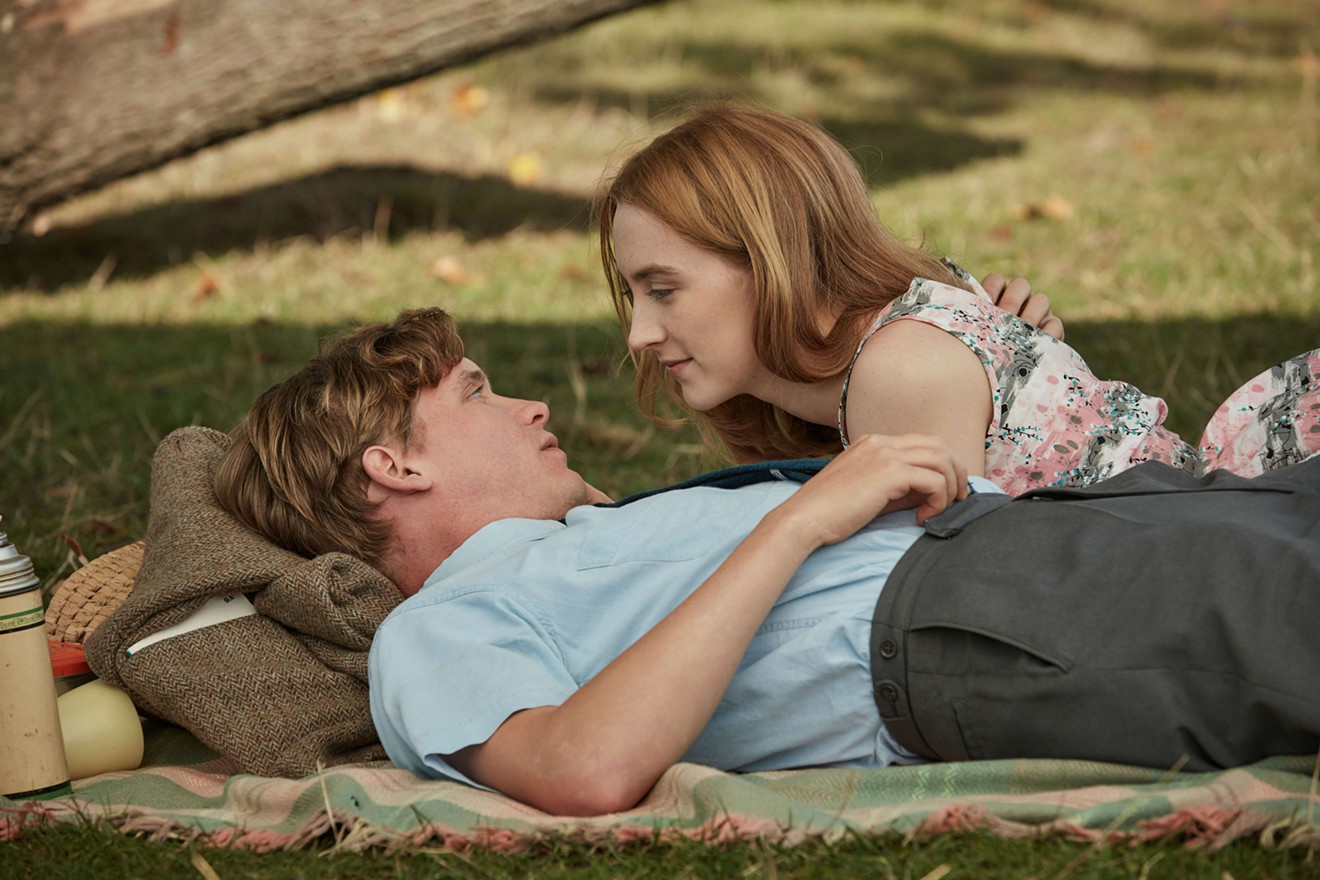Ian McEwan adapted On Chesil Beach from his own 2007 novella, so it’s a little odd to fault the film's screenwriter for losing what makes the original so powerful: its careful blend of sexual frankness and studied repression, the way the plangent prose casts a melancholy glow over things like erections and ejaculations and critical matters of whose hand went where and touched what. A movie can and should stand on its own, of course, but it still needs to find a way to give weight and scope to this intimate miniature. And while Dominic Cooke’s film succeeds at much of what it attempts, I can’t shake the feeling that there’s a dimension missing.
The story centers on a wan little honeymoon on the Dorset coast in 1962. The young newlyweds are violin virtuoso Florence (Saoirse Ronan) and history grad Edward (Billy Howle), each very much in love with but still painfully awkward around the other. As they go through their day, working toward the inevitable wedding night, we get glimpses into their early lives, their families and the early bloom of their romance. They are what back then would have been called modern people: She protests nuclear weapons and demonstrates for social causes, much to the bewildered disapproval of her elitist, conservative parents; he’s got a thing for rock ’n’ roll, and has spent much of his life around a free-spirited, brain-damaged artist mother and an unusually harried father.
And yet for all their enlightenment and modernity, Edward and Florence are painfully ignorant about sex and unable to talk about it — which, given their respective anxieties about what will happen once they’re at last free to sleep together, makes for a potentially disastrous situation. The setup is slender and simple, but it also demands precision. The period setting is crucial, catching these two young people just before the enormous social and political changes that will transform things like sex and family. The details matter; in them lie hints of the clash of cultures and generations that will soon be at hand. Thankfully, Cooke and McEwan have imagined the drab, conservative world of postwar England edging into the ’60s fully and diligently, right down to the overcooked beef and lifeless vegetables served our newlyweds by young, nosey servers at the inn where they’ve settled for their special day. (“This was not a good moment in the history of English cuisine,” McEwan writes in the book.)
Such an intimate story of repression also requires actors who can register emotions silently and delicately. (Remember, the newlyweds can’t talk about all this stuff; that’s the whole point of the movie.) And on that count, both Howle and Ronan are splendid. She manages to thread Florence’s forthrightness and directness in other matters through her reticence in this particular area. We can tell it’s tearing her up inside that she doesn’t know how to broach the subject of sex. He, meanwhile, has to convey both Edward's anticipation as well as his fear that he won’t measure up. He’s in love, he’s horny and he’s scared. Neither of these characters has any control over the situation, and both imagine the other has more.
Cooke’s film is atmospheric and occasionally visually striking. Chesil Beach makes for a captivating metaphorical image. In McEwan’s original, it has pebbles on one end and larger stones on the other, and the way these rocks change as the beach extends says something about the passage of time. Cooke takes a more Antonioni-esque route to roughly the same idea, using the sight of the beach stretching into the horizon with pale blue waves on either side to suggest the weight of an uncertain future. In fact, that feeling is present even before Edward and Florence arrive there; the distant lapping of waves, both romantic and ominous, can be heard throughout their intimate, awkward fumblings at the inn.
I’ll admit, I hadn’t read McEwan’s novella when I first saw the movie. I admired the film at the time, but couldn’t put my finger exactly on what seemed to be missing. Reading the book, however, clarified matters. Somewhere in this story about sex, even if it’s really about the inability to have sex, there needs to be, well, sex — or an honest, direct effort to deal with it at any rate. McEwan the novelist, it seems, isn’t as coy about it as McEwan the screenwriter. For all the measured elegance of his prose, there’s an earthiness to On Chesil Beach that’s missing from the film. The picture is a handsome, at times even moving adaptation — but if you think about it, it suffers from the very reticence it condemns.
[
{
"name": "Air - MediumRectangle - Inline Content - Mobile Display Size",
"component": "18855504",
"insertPoint": "2",
"requiredCountToDisplay": "2"
},{
"name": "Editor Picks",
"component": "17105533",
"insertPoint": "4",
"requiredCountToDisplay": "1"
},{
"name": "Inline Links",
"component": "18349797",
"insertPoint": "8th",
"startingPoint": 8,
"requiredCountToDisplay": "7",
"maxInsertions": 25
},{
"name": "Air - MediumRectangle - Combo - Inline Content",
"component": "17105532",
"insertPoint": "8th",
"startingPoint": 8,
"requiredCountToDisplay": "7",
"maxInsertions": 25
},{
"name": "Inline Links",
"component": "18349797",
"insertPoint": "8th",
"startingPoint": 12,
"requiredCountToDisplay": "11",
"maxInsertions": 25
},{
"name": "Air - Leaderboard Tower - Combo - Inline Content",
"component": "17105535",
"insertPoint": "8th",
"startingPoint": 12,
"requiredCountToDisplay": "11",
"maxInsertions": 25
}
]











